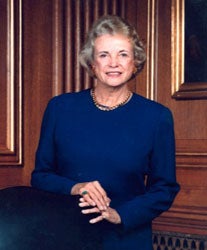Justice Sandra Day O’Connor and Archbishop Desmond Tutu of South Africa were honored this weekend at a conference at Harvard Law School sponsored by the Charles Hamilton Houston Institute for Race & Justice. The conference, “Charting New Pathways to Participation and Membership,” engaged a diverse group of thinkers, activists and organizers in panel discussions focused on issues of social justice, inclusion and the value of racial and cultural diversity.
O’Connor delivered an address assessing the nation’s progress toward inclusion five years after the U.S. Supreme Court’s decision in the University of Michigan affirmative action case, Grutter v. Bollinger. In that case, O’Connor wrote for the majority that the benefits of inclusion and of racial and ethnic diversity “are not theoretical but real.”
At HLS, O’Connor defended the Court’s 5-4 ruling in the landmark case, but also emphasized the necessity of reducing the achievement gap between black and white students beginning in early education.
“In the ideal world, I think skin color would be treated like eye color or like one’s religion, whose differences we tolerate and celebrate and do not rank,” said O’Connor in her address. “But in today’s America, I’m inclined to think that race still matters in painful ways,” she said.
In addition to O’Connor and Tutu, Dolores Huerta, co-founder and first vice president emeritus of the United Farm Workers, were honored at the event. The three honorees took part in a closing panel reflecting on recent changes in race relations. Tutu and O’Connor urged continued efforts to help racial minorities and suggested that unacceptable racial inequalities still exist in South Africa and in the United States, but Tutu chose to take a more optimistic view of the current situation.
“Things could be a great deal better,” he said, “but things could be a great deal worse.”
Chief Justice of the Constitutional Court of South Africa Pius Langa and world-renowned historian John Hope Franklin were honored in absentia.
The weekend-long conference, which was free and open to the public, drew a large number of attendees both from local communities and around the country. The conference featured more than 20 speakers on a variety of panels, including a panel on the media with Slate Magazine’s Dahlia Lithwick, and Washington Post Reporter Sally Quinn and a financial crisis panel featuring CEO Harvey Pitt of Kalorama Partners.
Adapted from an article by Athena Y. Jiang in the Harvard Crimson
